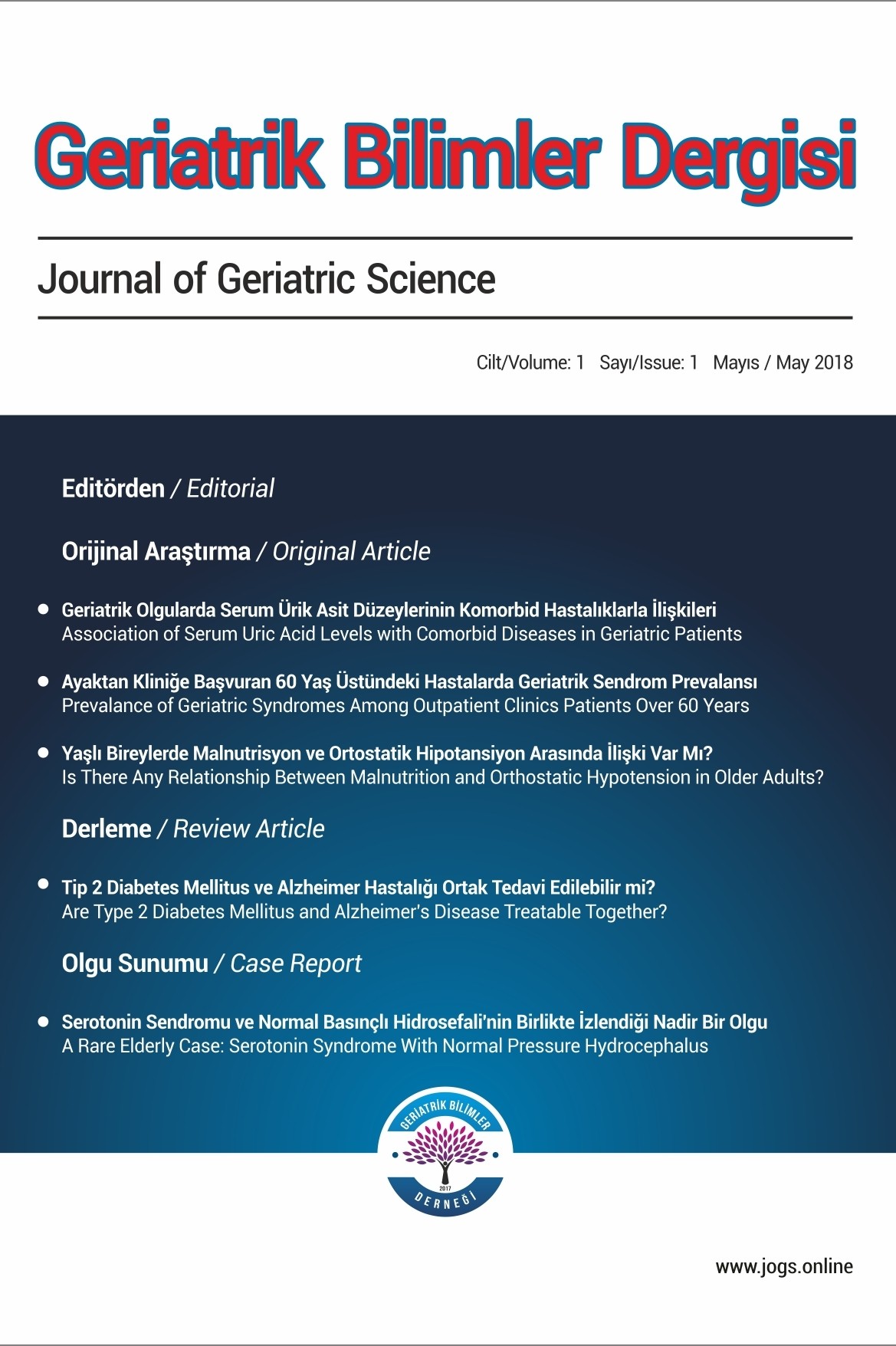Geriatrik Olgularda Serum Ürik Asit Düzeylerinin Komorbid Hastalıklarla İlişkileri
ürik asit, kronik hastalık, komorbidite
___
- 1. Durham. RH, eds. Encyclopedia of Medical Syndromes. New York: Harper and Brothers, 1960
- 2. Tinetti, M.E., et al., Shared risk factors for falls, incontinence, and functional dependence. Unifying the approach to geriatric syndromes. Jama, 1995. 273(17): p. 1348-53.
- 3. Inouye, S.K., et al., Geriatric syndromes: clinical, research, and policy implications of a core geriatric concept. J Am Geriatr Soc, 2007. 55(5): p. 780-91.
- 4. Fried, L.P., et al., Frailty in older adults: evidence for a phenotype. J Gerontol A Biol Sci Med Sci, 2001. 56(3): p. M146-56.
- 5. Soysal, P., et al., Inflammation and frailty in the elderly: A systematic review and meta-analysis. Ageing Res Rev, 2016. 31: p. 1-8.
- 6. Cruz-Jentoft, A.J., et al., Sarcopenia: European consensus on definition and diagnosis: Report of the European Working Group on Sarcopenia in Older People. Age Ageing, 2010. 39(4): p. 412-23.
- 7. Bulut, E.A., et al., Vitamin B12 deficiency might be related to sarcopenia in older adults. Exp Gerontol, 2017. 95: p. 136-140.
- 8. Cesari, M., et al., Sarcopenia and physical frailty: two sides of the same coin. Front Aging Neurosci, 2014. 6: p. 192.
- 9. Cruz-Jentoft, A.J., et al., Nutrition, frailty, and sarcopenia. Aging Clin Exp Res, 2017. 29(1): p. 43-48.
- 10. Swift, C.G., The role of medical assessment and intervention in the prevention of falls. Age Ageing, 2006. 35 Suppl 2: p. ii65-ii68.
- 11. Vaughan, C.P., et al., Urinary incontinence in older adults. Mt Sinai J Med, 2011. 78(4): p. 558-70.
- 12. Ayello, E.A. and C.H. Lyder, Protecting patients from harm: preventing pressure ulcers in hospital patients. Nursing, 2007. 37(10): p. 36-40; quiz 40-1.
- 13. Tekin, L., L. Ozcakar, and A.T. Isik, Delirium: a critical diagnosis for every member of the rehabilitation team. Rehabil Nurs, 2011. 36(5): p. 214-5.
- 14. Inouye, S.K., Delirium in older persons. N Engl J Med, 2006. 354(11): p. 1157-65.
- 15. Parazzini, F., et al., [Urinary incontinence: frequency and diagnostic and therapeutic approach in general practice in Italy]. Arch Ital Urol Androl, 2001. 73(3): p. 160-7.
- 16. Janssen, I., et al., Estimation of skeletal muscle mass by bioelectrical impedance analysis. J Appl Physiol (1985), 2000. 89(2): p. 465-71.
- 17. Chien, M.Y., T.Y. Huang, and Y.T. Wu, Prevalence of sarcopenia estimated using a bioelectrical impedance analysis prediction equation in community-dwelling elderly people in Taiwan. J Am Geriatr Soc, 2008. 56(9): p. 1710-5.
- 18. Cesari, M., et al., Frailty syndrome and skeletal muscle: results from the Invecchiare in Chianti study. Am J Clin Nutr, 2006. 83(5): p. 1142-8.
- 19. Selekler K., C.B., Uluc S., Power Of Discrimination Of Montreal Cognitive Assessment (MOCA) Scale In Turkish Patients With Mild Cognitive Impairment And Alzheimer's Disease. Turkish Journal of Geriatrics. 2010; 13 (3) 166-171.
- 20. Gungen, C., et al., [Reliability and validity of the standardized Mini Mental State Examination in the diagnosis of mild dementia in Turkish population]. Turk Psikiyatri Derg, 2002. 13(4): p. 273-81.
- 21. Babacan-Yildiz, G., et al., COST: Cognitive State Test, a brief screening battery for Alzheimer disease in illiterate and literate patients. Int Psychogeriatr, 2013. 25(3): p. 403-12.
- 22. Lawton, M.P. and E.M. Brody, Assessment of older people: self-maintaining and instrumental activities of daily living. Gerontologist, 1969. 9(3): p. 179-86.
- 23.Tinetti, M.E., Performance-oriented assessment of mobility problems in elderly patients. J Am Geriatr Soc, 1986. 34(2): p. 119-26.
- 24. Guigoz, Y., The Mini Nutritional Assessment (MNA) review of the literature--What does it tell us? J Nutr Health Aging, 2006. 10(6): p. 466-85; discussion 485-7.
- 25. Durmaz, B., et al., Validity and Reliability of Geriatric Depression Scale - 15 (Short Form) in Turkish older adults. Northern Clinics of Istanbul, 2018. 4(3): p. (inpress). doi: 10.14744/nci.2017.85047
- 26. Collard, R.M., et al., Prevalence of frailty in community-dwelling older persons: a systematic review. J Am Geriatr Soc, 2012. 60(8): p. 1487-92.
- 27. Eyigor, S., et al., Frailty prevalence and related factors in the older adult-FrailTURK Project. Age (Dordr), 2015. 37(3): p. 9791.
- 28. Bennett, A., et al., Prevalence and impact of fall-risk-increasing drugs, polypharmacy, and drug-drug interactions in robust versus frail hospitalised falls patients: a prospective cohort study. Drugs Aging, 2014. 31(3): p. 225-32.
- 29. Safran, D.G., et al., Prescription drug coverage and seniors: findings from a 2003 national survey. Health Aff (Millwood), 2005. Suppl Web Exclusives: p. W5-152-w5-166.
- 30. Plassman, B.L., et al., Prevalence of dementia in the United States: the aging, demographics, and memory study. Neuroepidemiology, 2007. 29(1-2): p. 125-32.
- 31. Roberts, R.O., et al., Urinary incontinence in a community-based cohort: prevalence and healthcare-seeking. J Am Geriatr Soc, 1998. 46(4): p. 467-72.
- 32. Munch, T., et al., Pain and falls and fractures in community-dwelling older men. Age Ageing, 2015. 44(6): p. 973-9.
- 33. Naseer, M., H. Forssell, and C. Fagerstrom, Malnutrition, functional ability and mortality among older people aged 60 years: a 7-year longitudinal study. Eur J Clin Nutr, 2016. 70(3): p. 399-404.
- 34. Blazer, D.G., Depression in late life: review and commentary. J Gerontol A Biol Sci Med Sci, 2003. 58(3): p. 249-65.
- 35. Djernes, J.K., Prevalence and predictors of depression in populations of elderly: a review. Acta Psychiatr Scand, 2006. 113(5): p. 372-87.
- 36. Bolt, K. and A. Bergman, Systems biology of aging. Adv Exp M
- Yayın Aralığı: Yılda 3 Sayı
- Başlangıç: 2018
- Yayıncı: Geriatrik Bilimler Derneği
Serotonin Sendromu ve Normal Basınçlı Hidrosefali’nin Birlikte İzlendiği Nadir Bir Olgu
Saadet Koç OKUDUR, Pınar SOYSAL, Ahmet Turan IŞIK
Geriatrik Olgularda Serum Ürik Asit Düzeylerinin Komorbid Hastalıklarla İlişkileri
Özge DOKUZLAR, Esra ATES BULUT, Süleyman Emre KOÇYİĞİT
Tip 2 Diabetes Mellitus ve Alzheimer Hastalığı Ortak Tedavi Edilebilir Mi?
Ayaktan Kliniğe Başvuran 60 Yaş Üstündeki Hastalarda Geriatrik Sendrom Prevalansı
Esra ATEŞ BULUT, Zehra KOSUVA ÖZTÜRK
Yaşlı Bireylerde Malnutrisyon Ve Ortostatik Hipotansiyon Arasında İlişki Var Mı?
Süleyman Emre KOÇYİĞİT, Pınar SOYSAL, Özge DOKUZLAR, Saadet KOÇ OKUDUR
